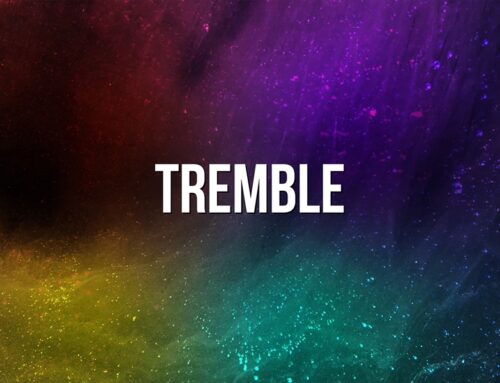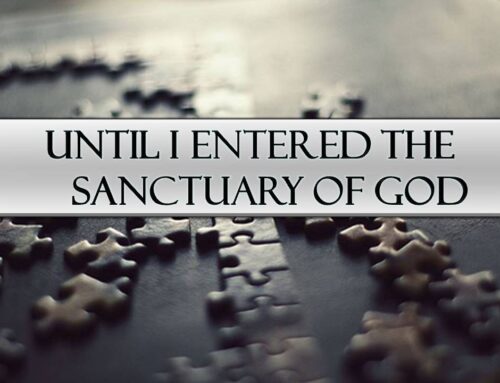Undoing the ‘Dark Night’ with a Conjunction
One short three letter word can transition you from darkness to light.
Wednesday, September 27, 2023
By Dr. Ray Rooney, Jr.
Reprinted from The Stand
How long, O LORD? Will you forget me forever?
How long will you hide your face from me?
How long must I take counsel in my soul
and have sorrow in my heart all the day?
How long shall my enemy be exalted over me?
Consider and answer me, O LORD my God;
light up my eyes, lest I sleep the sleep of death,
lest my enemy say, “I have prevailed over him,”
lest my foes rejoice because I am shaken.
But I have trusted in your steadfast love;
my heart shall rejoice in your salvation.
I will sing to the LORD,
because he has dealt bountifully with me. (Psalm 13)
Christians are often accused of having a pie-in-the-sky mentality. We’re denunciated for believing in heaven as described in the book of Revelation or for believing that Jesus is coming back on a cloud as the first chapter of Acts clearly says. “You people just don’t face reality,” is the oft-repeated charge.
That’s interesting because the thirteenth psalm is anything but a foray into the fantastical. As a matter of fact, it’s as real as it gets.
One of the most powerful and wealthy kings the world has ever known wrote that song. Had Joel Osteen’s best-seller Your Best Life Now been available to read in his day, I don’t think King David would have been a fan.
Yet here we are in the 21st century desperately trying to remain relevant in an increasingly secular and progressive society telling people that all their problems will be over once they accept Christ and all their heart’s desires will be met at the local church. It’s a lie and even the unchurched seem to know better.
No one can live an entire lifetime (however short or long) without experiencing first-hand what 16th-century mystic and poet John of the Cross called “the dark night of the soul.”
No one whose name is called in the hall of fame of Faith in Hebrews 11 found a way around it. None of the prophets, none of the apostles, and not even Jesus found a way around the horror of spiritual darkness, depression, and the feeling of abandonment by God. Psalm 13 is as real as it gets.
There is no incantation, mantra, or breath prayer that will ensure escape from spiritual darkness and depression. Nor is there a standard of behavior that will prevent it. Don’t forget, Job’s dark night commenced because God noted he was a “blameless and upright man, who fears God and turns away from evil” (Job 1:8). Then there was Jesus, the Son of God, who needed the ministry of angels on two occasions because He was so physically and spiritually waylaid and distraught.
There is not a single major figure in the Bible who doesn’t cry out at some point in their lives “how long will I be ignored or forgotten by God?” At some point, we’re all David who writes, “How long must I take counsel in my soul?” You know what that means, don’t you? He had given up hearing from God and was just listening to himself and trying to answer his own questions.
It only gets worse. David writes of a deep heart sorrow (v. 2) that won’t let go and even hints at suicide: “light up my eyes, lest I sleep the sleep of death” (v. 3).
Then comes the power of the conjunction. According to some grammarians, he errantly begins a sentence with the conjunction “but.” There is power in that simple three-letter word because he uses it in a way diametrically opposed to the way so many churchgoers use it. How many times have you heard something like, “I know God is all-powerful, but…”? Or, “I know what the Bible says, but…” You know there is nothing but justification for sin or unbelief following the conjunction.
Not with David. For him, “but” is the transition from the reality of bitterness and darkness to unfettered deliverance. He seems to be saying, “I’ve told you the reality of my depression and suffering and how I feel to be seemingly abandoned by God, “but” now let me tell you of the reality of my God.
“But I have trusted in your steadfast love; my heart shall rejoice in your salvation” and “I will sing to the Lord, because he has dealt bountifully with me” (vvs. 5-6 emphasis mine). To David, the deliverance that has yet to come is as much a reality as his present pain and suffering. That is faith and that is the way God expects His followers to live (Hebrews 11:6).
Christians are not called to ignore or dismiss reality as so many critics and detractors claim. Rather, we are to acknowledge the reality that we are presently experiencing but also include the reality of God’s faithfulness to us! Faith is not a one-way street. Paul writes, “He who calls you is faithful…” (1 Thessalonians 5:24)
For too many in the body of Christ, the “dark night of the soul” (depression: physical, emotional, and/or spiritual) is a mark of the defeated believer. Perhaps the naysayers should walk with David through his dark night and even “through the valley of the shadow of death” (Psalm 23:4).
We have to stop using “but” as an excuse for why we walk in faithlessness and disobedience and start using it, like David, as a key to unlock the door of boundless faith the likes of which even a tiny amount could move mountains (Matthew 17:20). Living in victory doesn’t please God. Trusting Him for it in the midst of our dark night does. Scripture says in many places that “the just shall live by faith” (Habakkuk 2:4; Romans 1:17; Galatians 3:11; Hebrews 10:38).
Remember, were it not for our “dark nights” what need would we have of faith at all?
RELATED:







Leave a Reply, please --- thank you.